Zinc: A Master Mineral
Our bodies rely on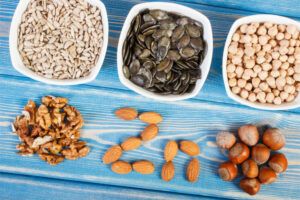 a balance between vitamins, minerals, amino acids, and nutrients to maintain health, wellness, and optimal physiological function.
a balance between vitamins, minerals, amino acids, and nutrients to maintain health, wellness, and optimal physiological function.
Zinc is one such mineral that is a foundational component to this physiological balance for a wide variety of reasons. Here we will explore the many roles of zinc in the human body, the causes and symptoms of zinc deficiency, and some of the most optimal sources of zinc.
Some of the links in this article are affiliate links. This means that if you click the link and subsequently make a purchase on the merchant’s website, we may earn a small commission at absolutely no additional cost to you. All opinions are entirely my own. I have used all products mentioned personally for years.
What Is Zinc?
Zinc is an essential trace element mineral that is a foundational part of the functioning of your body. “Trace element” refers to the fact that you only need a small amount of it to sustain optimal levels and perform its functions, however this small amount is a powerful player in the physiology of the human body.
Zinc has an inverse relationship with its counterpart mineral/metal, copper. That is, when zinc levels decrease, copper levels tend to increase and vice versa. Zinc and copper are antagonists, yet they work together in various ways to fulfill their respective physiological functions. A balance between the two is required for optimal health.
The body does not make its own zinc nor is it stored, so it must be ingested via diet and supplementation on a continuous basis.
The Many Roles of Zinc
Zinc plays an integral role in the proper functioning of many bodily systems and processes. Some of these roles include:
- Aids in digestion, helps to produce digestive enzymes, and break down of nutrients
- Helps produce bile
- Maintain the integrity of the stomach and gut lining
- Helps prevent ulcers in the stomach and small intestine (peptic ulcers)
- Maintain balance of the copper mineral/metal
- Thyroid hormone synthesis
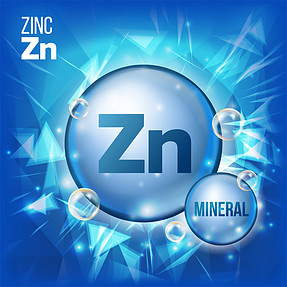
- Support the stress response
- Cortisol hormone stabilization
- Support nervous system function
- Support immune function
- Cell growth and division
- Progesterone hormone production
- DNA synthesis
- Gene expression
- Protein synthesis
- Wound healing
- Activating the senses such as smell and taste
- Support healthy vision
- Growth and development
- Used by hundreds of enzymes in various enzymatic reactions
- Protects the body from oxidative stress (explained further here)
- Supports neurological function and mental health
- Helps maintain heart health and blood pressure
- Helps reduce inflammation
- Maintain growth and repair of hair follicles
- Helps support connective tissue such as tendons and ligaments
One of the most far-reaching roles of zinc is its essential presence in the role of hundreds of enzymatic reactions. Enzymes are proteins that act as catalysts that help to accelerate different reactions in the body. These processes include the metabolism of nutrients, nerve function, carbon dioxide transfer, digestion, neurological function, and much much more.
Causes and Symptoms of Zinc Deficiency
Zinc deficiency is common today due to several important reasons.
First, our soil is more depleted in zinc now than it used to be, so our food contains less zinc as well, which contributes to deficiency.
Second, stress rapidly decreases zinc levels. In today’s fast paced world, chronic stress is almost the status quo which greatly contributes to depleted zinc levels.
Third, processing and refining foods can reduce or eliminate its zinc content, and many people consume a large quantity of processed and refined foods as part of their daily diet. These types of “food” include white flour, white pasta, white sugar, conventional cereals, etc.
Fourth, a common condition called Copper Toxicity can also contribute to zinc deficiency. Because of their close antagonistic relationship, zinc deficiency can also cause Copper Toxicity as well. This condition is explained much further here.
Symptoms of zinc deficiency can include:
- Chronic fatigue
- Digestive upset such as gas and bloating
- Constipation
- Diarrhea
- Insomnia
- Hair loss
- Decreased appetite
- Peptic ulcers
- White spots on the fingernails
- Anxiety
- Depression
- Brain fog
- Mood swings
- Seizures
- Frequent infections
- Skin issues such as dry skin, psoriasis, eczema, and acne
- Menstrual irregularities
- Difficulty conceiving
- Hormone imbalance such as estrogen dominance, low thyroid function, and adrenal insufficiency
- Copper Toxicity
- Prostate problems
- Cardiovascular conditions
- Vision problems
Sources of Zinc
As mentioned above, our body does not make or store zinc, so there needs to be a continuous supply of zinc that is ingested in order to maintain the levels that are required to fulfill its many important physiological roles. The following foods are high in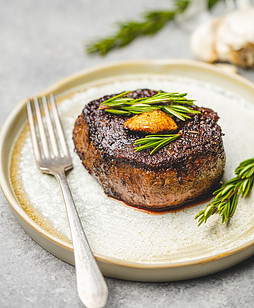 zinc and an excellent source of this critical mineral.
zinc and an excellent source of this critical mineral.
- Animal proteins: meats, poultry, fish, and eggs
High quality organic grass fed animal proteins such as beef, chicken, lamb, and turkey are all excellent sources of bioavailable zinc. Bioavailable means that the body can readily and easily absorb and utilize the zinc that is found in these sources.
Unprocessed meat is key, and organic/grass fed is preferred. Grass fed meats are much more nutrient dense than grain fed, which often contain GMOs (genetically modified organisms), pesticides, herbicides such as glyphosate, mycotoxins, and more. Organic meats are also free of added hormones and antibiotics.
Fish is also an excellent source of zinc such as flounder and salmon. Fish should always be purchased wild caught and organic if possible. Wild caught fish are less likely to be contaminated with toxic metals such as mercury.
Good quality organic eggs are also rich in zinc.
- Beans
Beans such as garbanzo beans/chickpeas, lentils, and black beans are all high in zinc.
Cooking beans and/or soaking and sprouting them helps to lower their phytic acid/anti-nutrient content. These are substances found in foods such as beans and nuts that bind to minerals and nutrients such as magnesium, calcium, zinc, and iron and prevent them from being absorbed properly.
Soaking and sprouting involves soaking the foods in water, rinsing, and then continuing to rinse periodically until sprouting occurs.
- Nuts and seeds
Nuts such as pecans and almonds and seeds such as sunflower and pumpkin seeds are all high in zinc. Pumpkin seeds are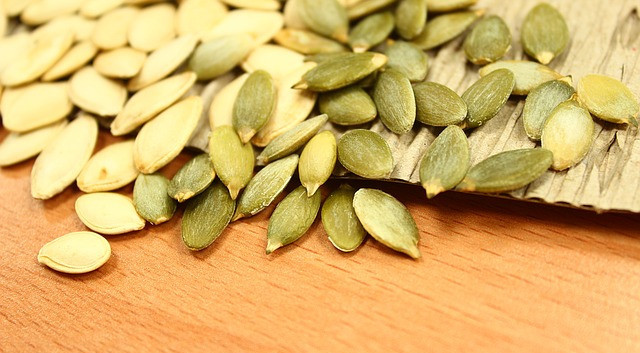 particularly high in zinc and an excellent addition to most diets.
particularly high in zinc and an excellent addition to most diets.
Again, soaking and sprouting nuts and seeds helps to lower the phytic acid/anti-nutrient content in them, which will help the zinc found in these foods to be better absorbed.
- Vegetables such as beet greens, kale, and asparagus
While animal proteins, nuts, and seeds all have a higher zinc content than vegetables, there are some vegetables that contain notable amounts of zinc.
These include asparagus, kale, mushrooms, beet greens, and green beans. These are also very nutrient dense vegetables that are full of fiber and are an excellent addition to most eating plans.
Zinc Supplements
While making sure that one’s diet is incorporating plenty of zinc rich foods is key, as mentioned previously, most foods today are lower in zinc due to the depletion of this mineral in our soil. Therefore, a daily zinc supplement is usually needed in order to ensure that optimal levels are being met.
All zinc supplements are not created equal. All supplements in general are not created equal.
As a general rule, looking for supplements that are free of common allergens such as soy, yeast, corn, and gluten is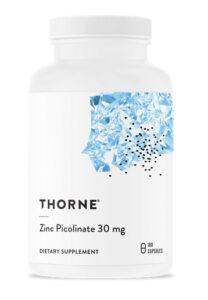 important.
important.
Furthermore, the form of zinc that is used in a supplement is significant as well, as this will have to do with how the mineral is absorbed in the body. Usually, zinc picolinate is the best absorbed form.
The zinc supplement that I have used with the most efficacy is Thorne Zinc Picolinate.
Thorne is a superior line of supplements that I’ve been using for over 8 years.
This supplement has successfully helped to increase my zinc levels and keep them maintained at a sufficient level.
Dosing is completely individual and needs to be determined with one’s natural health practitioner.
15-30mg per day is a common recommended dose, but again, dosing is very individualized per your own unique bioindividuality and the particular necessities of your case.
Click here to check out Thorne Zinc Picolinate.
⭐️When you use the above purple links, you will automatically receive a 5% discount on your order at Thorne :)⭐️
In Closing…
Zinc can most certainly be considered a master mineral, as it is a foundational element that is needed for a plethora of vital bodily functions and processes.
Optimizing one’s zinc intake is a key component of most healing protocols and is an excellent way to improve and maintain overall health.
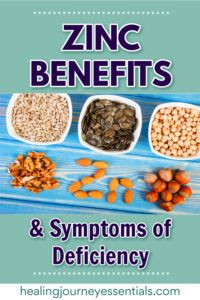
REFERENCES
I just discovered zinc is excellent for my body’s chronic leg pain and I am going to check to see if it’s helping my blood sugar. I feel better I sleep. Also my day body function better since I’ve been taking zinc extract supplement. Normally I will get sleepy during the day and now I’m able to have some great energy throughout the day. Your article was good to get some understanding of what zinc is all aboutb and what it does.
Hi Christina! Thank you so much for your comment! 🙂
I’m so glad to hear that zinc has been helping you! It helps me a lot too!
It really is such an incredible mineral with so many important functions in our body.
All the best to you on your journey!
Warm wishes,
Megan 🙂